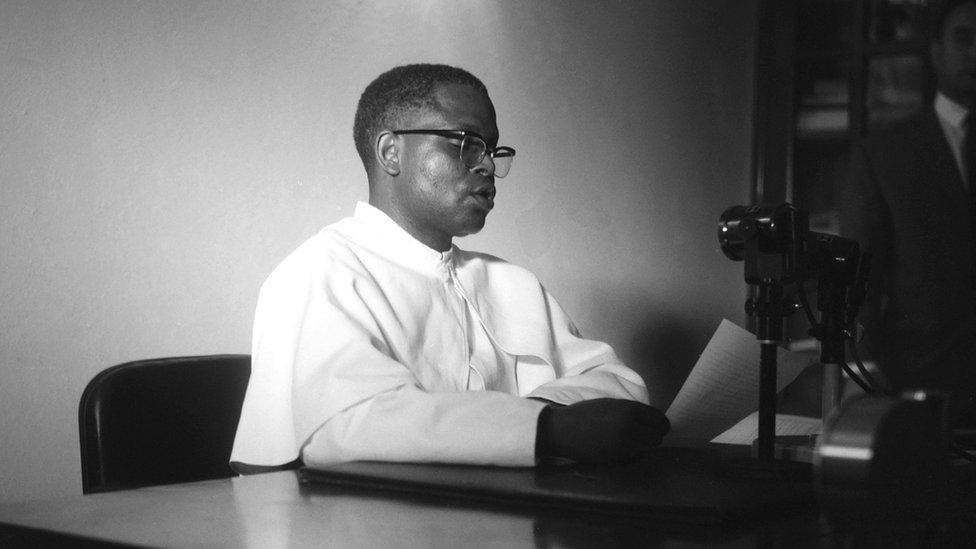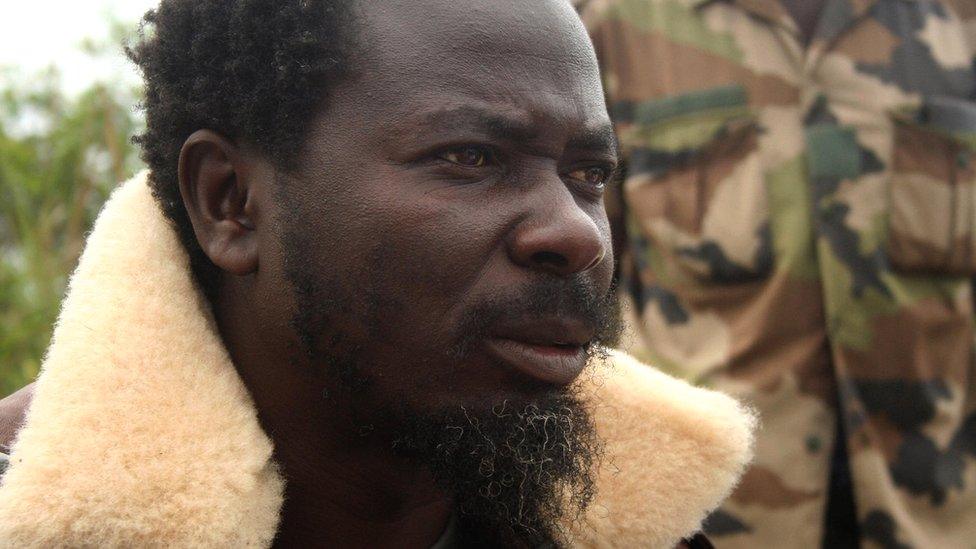Republic of Congo profile
- Published
A chronology of key events:
1400s - Bakongo, Bateke and Sanga ethnic groups arrive in what is now the Republic of Congo.
1482 - Portuguese navigator Diogo Cao explores the coastal areas.
French rule
1880 - French explorer Pierre Savorgnan de Brazza negotiates an agreement with the Bateke to establish a French protectorate over the north bank of the Congo river.
1907 - France restricts the role of concessionaires following widespread outrage at revelations of the brutalities of forced labour.
1910 - Middle Congo, as it was known then, becomes a colony of French Equatorial Africa.
1928 - African revolt over renewed forced labour and other abuses carried out in the course of building the Congo-Ocean railway, which resulted in the death of more than 17,000 Africans.
1946 - Congo given a territorial assembly and representation in the French parliament.

Congo's first pro-independence president, Fulbert Youlou, was forced to resign by protests in 1963
1958 - Congolese vote for autonomy within the French Community.
Independence
1960 - Congo becomes independent with Fulbert Youlou as president.
1963 - President Fulbert Youlou forced to resign following workers' unrest; Alphonse Massamba-Debat becomes president and Pascal Lissouba prime minister.
1964 - President Massamba-Debat sets up the National Revolutionary Movement as the sole party and proclaims a non-capitalist path of economic development.
1968 - Massamba-Debat ousted in a coup led by Marien Ngouabi, who continues his predecessor's commitment to socialism but sets up his own party, the Congolese Workers Party (PCT).
1970 - President Ngouabi proclaims Congo a Marxist People's Republic with the PCT as the sole legitimate party.
1977 - Ngouabi is assassinated. Massamba-Debat and the Archbishop of Brazzaville, Emile Cardinal Biayenda, are killed shortly afterwards.
Joachim Yhombi-Opango becomes president.
1979 - Joachim Yhombi-Opango hands over the presidency to the PCT, which chooses Denis Sassou-Nguesso as his successor.
1981 - Congo signs treaty of friendship and cooperation with the Soviet Union.
1990 - The PCT abandons Marxism.
1992 - Voters approve a constitution which establishes a multi-party system.
Pascal Lissouba becomes president in Congo's first democratic election.
Civil strife
1993 - Bloody fighting between government and opposition forces over disputed parliamentary elections.
1994-95 - Ceasefire between government and opposition established; opposition given government posts.
1997 - Full-scale civil war breaks out; pro-Sassou Nguesso forces, aided by Angolan troops, capture Brazzaville, forcing Lissouba to flee.
1999 - Government and rebels sign a peace deal in Zambia providing for a national dialogue, demilitarisation of political parties and the re-admission of rebel units into the security forces.

Pastor "Numi" was co-leader of the Ninja rebels before joining mainstream politics in 2007
2001 April - Peace conference ends by adopting a new constitution, paving the way for presidential and parliamentary elections.
2001 September - Transitional parliament adopts a draft constitution. Some 15,000 militia disarm in a cash-for-weapons scheme. IMF starts clearing Congo's $4bn debt.
2001 December - Former president, Pascal Lissouba, convicted in absentia on treason and corruption charges, and sentenced to 30 years' hard labour by the high court in Brazzaville.
2002 January - About 80% of voters in constitutional referendum approve amendments aimed at consolidating presidential powers.
2002 March - Denis Sassou Nguesso wins presidential elections unopposed after his main rivals are barred from the contest.
Clashes with rebels
2002 March - Intense fighting between government and "Ninja" rebels drives many thousands of civilians from their homes in Pool region. The rebels, loyal to former PM Bernard Kolelas and led by renegade priest Pastor Ntumi, name themselves after the famous Japanese warriors.
2002 June - Government troops battle Ninja rebels in Brazzaville. About 100 people are killed.
2003 March - Government signs deals with Ninja rebels aimed at ending fighting in Pool region. Ninja leader Pastor Ntumi agrees to end hostilities and allow the return of the rule of law.
2004 June - World diamond trade watchdog removes Congo from list of countries recognised as dealing legitimately in diamonds.
2005 April - Government says a group of army officers, arrested in January over an arms theft, had been planning a coup.
2005 October - Former PM Bernard Kolelas is allowed home to bury his wife after eight years in exile, during which he was sentenced to death on war crimes charges. He is given an amnesty in November.
2006 January - Congo is chosen to lead the African Union in 2006 after disagreements within the body about Sudan's leadership bid.
President Sassou Nguesso accuses France of interfering in his country's affairs, following a decision by a French appeal court to reopen an investigation into the disappearance of more than 350 refugees in 1999.
2007 June - Former "Ninja" rebels led by renegade Pastor Frederic Ntumi ceremoniously burn their weapons to demonstrate their commitment to peace.
2007 June-August - Parliamentary elections, boycotted by some 40 parties. Ruling party wins 90% of seats.
Debt cancelled
2007 November - London Club of private sector creditors cancels 80% of Congo's debt.
2009 May - French magistrate opens probe into alleged embezzlement by President Sassou Nguesso and two other African leaders following lawsuit by an anti-corruption group.
2009 July - President Denis Sassou Nguesso gains another seven years in power following elections boycotted by the opposition.
2010 March - Paris Club of creditor countries and Brazil agree to cancel all the debt owed to them by Congo - about $2.4 billion.
2010 November - French appeal court gives go-ahead for probe into corruption charges against three African leaders, including President Denis Sassou Nguesso.
2012 March - An ammunition dump in Brazzaville explodes, killing 282 people and injuring more than 2,300.
2013 February - Congo declared to be compliant with standards set by the Extractive Industries Transparency Initiative for the disclosure of revenues from oil.
2013 May - Brazil says it will cancel or restructure $900m of debt with Africa, including Congo, which has the highest debt with Brazil.
2014 May - UN says the repatriation of 130,000 DR Congo nationals from Republic of Congo over past month has caused a humanitarian crisis.
Constitution referendum
2015 October - Voters in referendum approve constitutional changes allowing the president to run for a third term. The opposition boycotts the vote and says the result is fraudulent.
2016 March - President Denis Sassou Nguesso gains another term following an election described as fraudulent by the opposition.
2016 April - Government buildings in Brazzaville are attacked in post-election unrest.
2017 June - The UN says the Congo Republic will withdraw its troops from a UN peacekeeping mission in Central African Republic after a review sparked by sexual abuse accusations found "systemic problems in command and control."
2017 December - The government and the rebel group known as Ninjas sign a ceasefire deal.